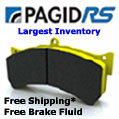Pagid RS29 Minimum pad depth
#31
Burning Brakes
As a more "recreational" driver I see no reason why you can't get a little more life from your pads than merely 50%. The RS29 is a pretty good street compound unless you live in a cold climate. I suggest you try to run them past 50% and see for yourself if your braking performance declines. If not then you can run them longer and get more value out of them. Just make sure you replace them before you're close to the backing plates!!
#32
Addict
Rennlist Member
Rennlist
Site Sponsor
Rennlist Member
Rennlist
Site Sponsor
This. Too much heat will cause the pads to fade and ABS will try to compensate for that fade which will create even more heat.
__________________
Your Porsche Parts Superstore



Parts | Tech-Session | Facebook | Youtube
Jason Burkett
Paragon Products - Porsche Parts & Accessories*- 800.200.9366
Tech Session - Porsche Tech & Info*- 361.289.8834
jason@paragon-products.com
Your Porsche Parts Superstore



Parts | Tech-Session | Facebook | Youtube
Jason Burkett
Paragon Products - Porsche Parts & Accessories*- 800.200.9366
Tech Session - Porsche Tech & Info*- 361.289.8834
jason@paragon-products.com
#33
Rennlist Member
EXACTLY
#34
Rennlist Member
you are again, agreeing with an authoritative figure here and are not providing any proof or logic. agreeing is not proof
this all is an assumption at this point . a theory. I would like to see some reasoning behind it.. there might be proof or reasoning that can explain it, but just because someone says it so , doesn't make it true. im easy... alll i need is something remotely factual here.
#35
Rennlist Member
Mark, you assume I have a need to prove anything to you. If you choose to discredit my or Jason's experience, that's your issue. Have a great day !
#36
Rennlist Member
but if true (and i believe it is) this is because the Coff of friction is higher so you might be at a higher stopping power when things get beyond what the OTHER pads can do, so your statement would be true.
running to the backing plate still might not have any issues, but more heat to the calipers... AND, this is going to depend on the calipers (size and pad size too)
my system is very sensitive to thin pads, because they are so small in area and the calipers are very small as well.
#37
Rennlist Member
ABS doesnt seem to have one physical capability to increase brake temps or make the brakes work harder to create heat. thiis is a discussion, not a court room.
you made the statement, so how do you know this. experience? really?
again, what you have seen might not reflect what is happening. way too many variables Dave. what im asking is how is it possible. ............... the real question is on the authority, jason to provide the theory on how this is remotely possible.
constant pressure on the rotor will make more heat than high frequency oscillating pressure. if it doesn't, then the constant pressure could be more and maybe you have "experienced" that. Hey, it's not only me.. " Audi" on this thread says the exact same thing and has experienced the opposite as i have as well.
#38
Rennlist Member
ive determined this by the effects of such a condition. pedal becomes softer which is a result of the beginnings of fluid boil... new pads dont have this effect on the calipers after a race where they are uses at the limit and reach near 350 degrees as well as rotor temps in the 1400F range. (not DE)
#39
Rennlist Member
i contend, more than if ABS is used. and that even is a loaded statement. there is some ABS that is probably equal to the best foot skills.... but i would say , most are not.
sure , ABS with a beginner vs a skilled foot, that might be a good point you could make on the topic... but not for a racer with good braking skills.
constant usually always outweighs high frequency ABS.
there is no logical reason why ABS would create any more heat that a threshold braking situation.
if you have an idea of how this is not true or possible, i would like to hear it.
not just "jason said its true".
#40
Rennlist Member
Thread Starter
The consensus here is that it is probably worthwhile replacing these pads once you reach the 50% wear mark. Fresh pads will yield much better braking performance than well worn ones. However, a dual-purpose car that has RS29's for both street and track suggests you may not be pushing the car on the track as hard as a more serious racer. You won't be generating as much heat and you won't be demanding or expecting as much from your brakes.
As a more "recreational" driver I see no reason why you can't get a little more life from your pads than merely 50%. The RS29 is a pretty good street compound unless you live in a cold climate. I suggest you try to run them past 50% and see for yourself if your braking performance declines. If not then you can run them longer and get more value out of them. Just make sure you replace them before you're close to the backing plates!!
As a more "recreational" driver I see no reason why you can't get a little more life from your pads than merely 50%. The RS29 is a pretty good street compound unless you live in a cold climate. I suggest you try to run them past 50% and see for yourself if your braking performance declines. If not then you can run them longer and get more value out of them. Just make sure you replace them before you're close to the backing plates!!
When I run out of RBF maybe I'll switch to Castrol SRF.
For me the upgrade to 997.1 GT-3 brakes/rotors and Pagids was a good step up and my driving needs to catch up with the car anyways.
#41
Burning Brakes
On my old clunker, pfc tend to destroy my caliper seals after 1 event, pagid i can go a whole year or more.
Talking to a pagid rep the last bit of pad that you get the crumbling on is because of the adhesive to the backing plate so change em out prior, I've run it lower with no issue but now change them a little sooner
Talking to a pagid rep the last bit of pad that you get the crumbling on is because of the adhesive to the backing plate so change em out prior, I've run it lower with no issue but now change them a little sooner
#43
Rennlist Member
On my old clunker, pfc tend to destroy my caliper seals after 1 event, pagid i can go a whole year or more.
Talking to a pagid rep the last bit of pad that you get the crumbling on is because of the adhesive to the backing plate so change em out prior, I've run it lower with no issue but now change them a little sooner
Talking to a pagid rep the last bit of pad that you get the crumbling on is because of the adhesive to the backing plate so change em out prior, I've run it lower with no issue but now change them a little sooner
these calipers. (near the same as yours) are now in the 15th season, and several seasons of use of PFC. I would be willing to bet they have seen a lot more heat than yours have.
the crumpling is not the aheasive on the backing plate, but the chemical and thermal break down of the chemicals used to bind the material together . ive had the pagid crumple apart at greater than half gone. (RS14, 4-4, etc) the PFC , do not have such a bad cumple problem. certainly the material is weaker to keep shape near the 5mm marks vs near new.
#44
Rennlist Member
However, if you have some theory how just rapid on and off of the brakes some how magically creates heat, i sure would be interested to hear it.
#45
Rennlist Member
jason, that is a different condition all together and not true. too much heat, as i experienced in my braking system and yes, you are right, the pads willl fail by fading. heat then goes up with additional pressure, on the rotors , but no additional friction. (the definition of fade). this creates more heat. abs doesn't compensate, it only trys to fight lock up by oscillating pedal pressure. so actualy, abs will reduce temps because it is, at a high frequency, releasing pressure on the pads to the rotors.

